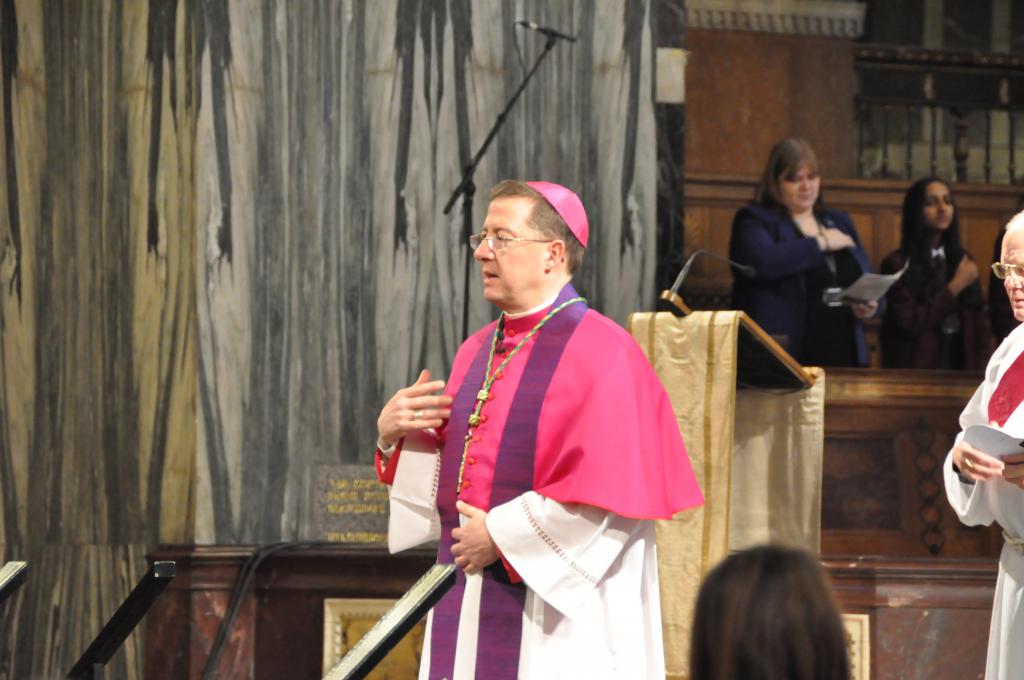For Education Sunday, 1 February, Bishop John Sherrington has written a pastoral letter on behalf of Cardinal Vincent about the work and mission of Catholic education in the diocese.
The video of the pastoral letter can be seen below. The letter in full is also available below:
Dear brothers and sisters in Christ,
On Education Sunday and as Chairman of the Diocesan Education Commission, I am glad to have this opportunity to thank God for the gift of Catholic education in the Diocese; the schools, the staff, the governors, parents who entrust their children to the schools and all the pupils who contribute to this important aspect of the mission of the Church. I also thank the Diocesan Education Commission and Service for their work.
The mission of the Church is to proclaim the good news given to us by the birth, life, death and resurrection of Jesus Christ. This is the promise of eternal life and an invitation to live life to the full as disciples of Jesus Christ. The Catholic school makes a vital contribution to this mission by enabling each child to develop his or her God-given gifts to their fullest potential, to know the abundant love of God and to become friends of Jesus Christ. A foundation in prayer and friendship with Christ will serve them in later life so that they make their unique contribution to the world around them and foster the values of God’s kingdom and the common good – justice, peace, love and joy. As Pope Francis wrote, ‘Catholic schools, which always strive to join their work of education with the explicit proclamation of the Gospel, are a most valuable resource for the evangelization of culture…’ (The Joy of the Gospel 134)
What do we mean by the ‘evangelisation of culture’? Pope Francis answered this question in the following way, ‘To give witness with joy and simplicity to what we are and what we believe in.’ Such witness is infectious and attracts others to the life-giving message of Christ and his Church.
The Catholic school is called to witness with joy and simplicity to the goodness of each and every person, especially the vulnerable and disadvantaged. The school is called to be a beacon and witness to God’s gracious gift of mercy shown us by the actions and words of Jesus Christ who is the Way, the Truth and the Life. Christ is at the centre of the Catholic school.
On walking through the doors of a Catholic primary school, joy is palpable in the faces of the children who smile, laugh and clearly enjoy the experience of school. Sometimes with teenagers the joy is less obvious; but as one head said to me, they ‘like being at school because it is safe and there is plenty to do and learn’. When I ask children what is good about their school, their replies include: ‘it is a safe place’, ‘I have many friends’, ‘I am helped to learn’, ‘the staff support me’ and ‘Jesus is love’.
To have a strong Catholic identity is not something mysterious or difficult. It is demonstrated in familiarity with daily prayer, symbols such as the crucifix and statues, a chapel and place of prayer, relationships of respect and understanding, developing one’s gifts and recognising a wide range of achievement and success. Each student is centre-stage and the focus of care and learning. Leadership is modelled on Jesus who served all and sacrificed his life for others.
Catholic education is an education in mercy. Mercy, from the Latin word misericordia means having a heart for the poor. The school community is called to have a heart for the poor, whether for the students who is struggling, the one who is disadvantaged or by looking outwards to the needs of others; for example through link partnerships and overseas projects, by supporting CAFOD, the Catholic Children’s Society and other charities. Our schools reveal this attitude of mercy when they provide good pastoral care and support staff and students through times of illness, bereavement and crisis.
The schools in our diocese have been built up through the sacrifice of parents, the commitment of staff and governors who so often go the extra mile because they love their work and see it as a call from God or a vocation, and the students who bring their energy and vitality to build a school community that looks out to serve others.
What are some of the challenges that our schools face today?
First, we need more young people to become teachers who see their profession as a calling from God and are prepared later to take on the responsibility of senior leadership. Secondly, we need more foundation governors who are committed to the values of Catholic education and willing to sacrifice time and energy for the good of the school and serve others with their expertise and gifts. In particular, we need governors who have the right skills to serve schools in the more challenging situations in our diocese where governors can be hard to find. Thirdly, there is the challenge of resources and finance as state funding becomes increasingly difficult to access.
Together with the Cardinal, I thank you all for your dedication and service to the call of Catholic education. We pray that God will answer our prayers and provide for our needs.
With every blessing,
Bishop John Sherrington
Auxiliary Bishop of Westminster
Chairman of the Diocesan Education Commission




